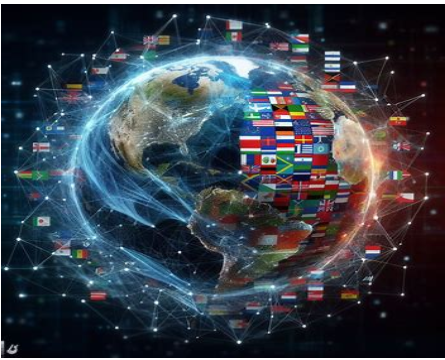GS Paper - 3
Why in the news?
- In a recent joint session, the High-level Committee on Programmes and the High-level Committee on Management discussed the transformative potential of Artificial Intelligence (AI) while highlighting the associated risks.
- The session focused on the use and governance of AI and related frontier technologies, acknowledging their capacity to reshape the global landscape.
Highlights of the Joint Committee Meeting on AI Use and Governance:
- UNICEF hosted a joint session of the High-level Committee on Programmes and the High-level Committee on Management focusing on AI and related technologies.
- Emphasized the UN's commitment to a proactive, ethical, and human rights-based approach to AI.
- Concerns highlighted include inaccuracies in content generated by AI systems, potential impacts on peace and security through misinformation, and the weaponization of AI by state and non-state actors.
- Economic concerns addressed potential impacts on labor markets and digital divides, particularly in developing countries.
- Human rights considerations focused on vulnerability of women, girls, and marginalized communities to risks posed by AI.
Suggestions and Recommendations:
- Advocated for the establishment of national AI agencies to address governance gaps and manage associated risks.
- Proposed national approval processes for evaluating AI systems based on benefits and risks, akin to existing regimes for therapeutic goods.
- Suggested the creation of a global agency to address international challenges related to AI, providing certification and risk mitigation.
- Called for expansion of government capacities to develop regulatory frameworks ensuring technology benefits the common good, upholds the rule of law, and protects human rights, environment, and gender equality.
- Highlighted the need for inclusion of scientists and researchers in governance efforts.
Role of UN:
- Stressed the critical role of the UN in addressing AI challenges, promoting systems aligned with human rights, sustainable development, peace, fairness, and accountability.
- Advocated collaboration with diverse stakeholders, including developed and developing countries, civil society, private sector, and academia, to drive AI regulation.
- Emphasized the UN's promotion of an AI governance approach based on fundamental principles such as human rights, gender equality, and inclusivity.
Principles in the UNESCO Declaration on AI:
- Respect, protect and promote human rights and fundamental freedoms and human dignity.
- Prioritize ecological sustainability in the development and deployment of AI technologies.
- Embrace diversity and inclusiveness as fundamental principles in AI applications.
- Advocate for good governance and equitable development in AI initiatives.
The declaration recommends the establishment of a comprehensive normative and operational framework within the United Nations system to guide the ethical use of AI on a system-wide level.
How AI is impacting national sovereignty ?
- Transformation of Territorial Sovereignty:
- The proliferation and widespread use of AI systems have brought about a shift in the traditional concept of territorial sovereignty, evolving it into digital sovereignty.
- Corporate Governance Dynamics:
- Corporate governance now revolves around transborder, multilevel structures, reflecting the central role of AI in shaping governance frameworks.
- Data Accumulation Redefining Sovereignty:
- The control over people and nations has undergone a change, with sovereignty now linked to the accumulation of classified data.
- Risk of Disinformation and Misinformation:
- The prevalence of disinformation and misinformation poses a significant risk to effective governance and development.
- It emphasizes the need for measures to ensure accuracy and accountability in governance.
- Manipulation of Democracy:
- The increasing deployment of AI tools has opened avenues for manipulating democratic processes, posing threats to both decisional and informational privacy.
- Threats to Individual Autonomy:
- AI's expanding influence raises concerns about the privacy, anonymity, and autonomy of individuals, as it seeks to impact their economic and political choices.
- Global, Regional, and National Safeguards:
- To safeguard democracy and privacy, concerted actions are required at the global, regional, and national levels, ensuring protective measures are in place.
Dangers arising from AI for nations.
The use of AI has significantly transformed warfare, especially through the deployment of unmanned lethal autonomous weapons systems (LAWs). However, it has some drawbacks.
Security and Vulnerability to Cyber Threats:
- AI systems are susceptible to cyberattacks and exploitation, posing a risk to national security and sovereignty as malicious actors may manipulate these systems for harmful purposes.
Diminished Human Capacity and Accountability:
- Excessive reliance on AI systems has the potential to diminish human capabilities and performance, introducing challenges in assigning accountability, particularly in situations where AI encounters unexpected scenarios leading to potential errors.
Ethical Considerations in AI Governance:
- The translation of ethical principles into explicit guidelines for AI-driven decisions or robotic behavior is a complex task.
- It encompasses various challenges such as
- Biased algorithms,
- Privacy infringement,
- lack of transparency.
Economic Impacts of AI Implementation:
- The integration of AI systems demands substantial upfront investments in infrastructure, data collection, and model development.
- Additionally, the ongoing maintenance and updates for AI systems incur significant costs, potentially leading to unemployment and the displacement of human workers by machines.
Conclusion
In conclusion, the prevailing uncertainty regarding the dominance of surveillance capitalism, digital authoritarianism, or liberal democratic values raises questions about the foundational principles guiding human interaction and societal progress in the digital age.
As a result, a sophisticated and collaborative strategy is essential to effectively confront the continually evolving challenges presented by AI on a global level.

